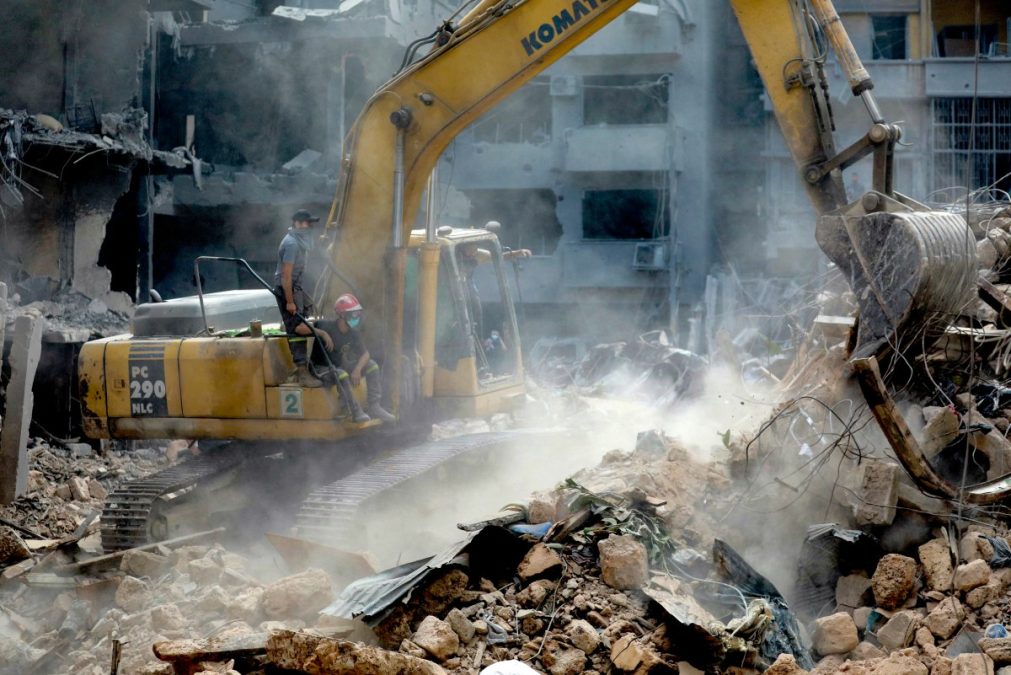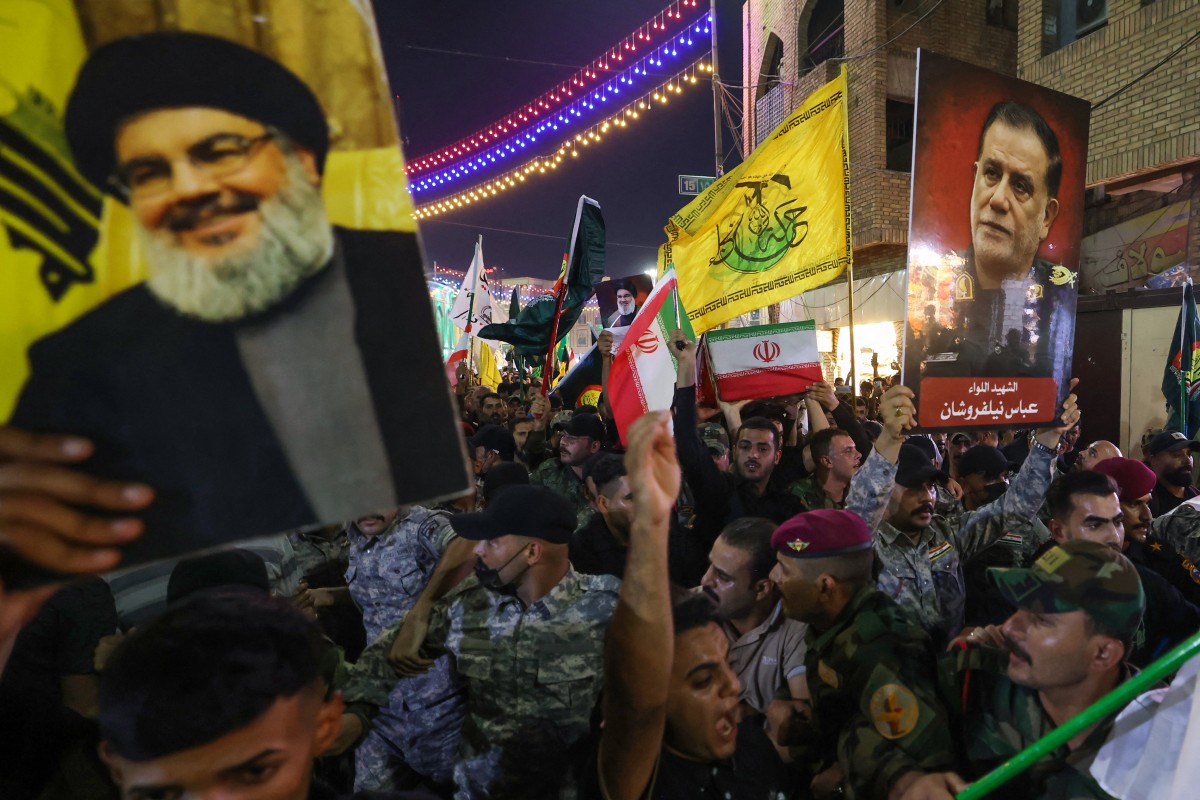Washington, United States – Israel has assured the White House that a planned retaliatory attack on Iran won’t target nuclear or oil facilities, US media reported Monday.
Israel has vowed to counterattack after Iran fired ballistic missiles at the country on October 1, launched in response to Israel’s killing of Tehran-aligned leaders in the region, along with a general in Iran’s Revolutionary Guards.
Citing unnamed US officials, the Washington Post said that Israeli Prime Minister Benjamin Netanyahu had reassured the White House that a counterstrike it is contemplating would target only military sites.
The Wall Street Journal, also citing US officials speaking on condition of anonymity, said the pledge came in a call between US President Joe Biden and Netanyahu last week, as well as in conversations in recent days between US Defense Secretary Lloyd Austin and his Israeli counterpart, Yoav Gallant.
The plan “was met with relief in Washington,” the Washington Post reported.
Biden has warned Israel against striking Iran’s nuclear or oil facilities in order to avoid a further expansion of regional war and amid worries of a spike in global energy prices.
The attack was Iran’s second direct attack on Israel after missile and drone fire in April, carried out in response to an air strike on the Iranian consulate in Damascus that is attributed to Israel.
Oil prices drop
Oil prices extended losses Tuesday after a report said Israeli Prime Minister Benjamin Netanyahu had told US President Joe Biden he would not strike Iran’s crude or nuclear facilities in retaliation for a missile attack earlier this month.
The sell-off came as the commodity is hit by worries about China’s economic outlook after Beijing failed to announce any new stimulus at a weekend briefing, nor provide details on a raft of measures unveiled at the end of last month.
However, equity traders were broadly upbeat, pushing most Asian markets higher after another record close for the Dow and S&P 500 on Wall Street, with the third-quarter reporting season about to get under way.
Both main oil contracts dropped around three percent in early exchanges — having lost at least two percent Monday — after the Washington Post reported that Netanyahu had pledged to target Iran’s military rather than its crude and nuclear sector.
Investors have been on edge since Tehran launched a barrage of missiles at Israel at the start of the month, fuelling concerns of a response that could spark a region-wide conflict.
The commodity has swung wildly in recent weeks after Tel Aviv opened a new front against Hezbollah fighters in Lebanon, while also continuing its battle against Hamas in Gaza.
Netanyahu on Monday vowed to hit Hezbollah without mercy, a day after the Iran-backed group’s deadliest strike on Israel since the start of their war in late September.

Adding to the downward pressure on oil is concern that China would struggle to reignite the world’s second-biggest economy after a much-anticipated news conference on Saturday left investors wanting.
There had been hope Finance Minister Lan Fo’an would unveil a multi-billion-dollar package of support including fiscal help to go alongside measures announced in September that largely focused on the troubled property sector.
The disappointment, which came after another briefing that fell short last Tuesday, has dampened a rally on Chinese markets, with Hong Kong and Shanghai paring the blockbuster surge that greeted the initial batch of stimulus.
Weaker-than-expected trade and inflation data for September highlighted the need for economic help, though analysts warned they did not see any details being released until an upcoming Communist Party meeting that has yet to be set.
Key data later in the week, including on retail sales, trade and economic growth, could provide a fresh update on the state of the country’s finances.
“Everywhere you look, China is in desperate need for fiscal support, with very weak domestic demand alongside an economy facing deflationary pressures and softer global demand,” said Rodrigo Catril at National Australia Bank.
Shares in Shanghai and Hong Kong fell Tuesday, though there were gains in Tokyo as traders there returned from a three-day weekend to push the Nikkei 225 above 40,000 points for the first time since July.
Sydney, Seoul, Singapore, Taipei, Manila and Jakarta also rose.
Israel launches strikes
Israel’s military launched strikes Tuesday on eastern Lebanon, official Lebanese media reported, as Hezbollah fought Israeli soldiers after Prime Minister Benjamin Netanyahu vowed no mercy for the group.
The premier’s pledge on Monday came a day after a drone attack by the Iran-backed Lebanese group on an Israeli base killed four soldiers, while volunteer rescuers said another 60 people were wounded.
“We will continue to mercilessly strike Hezbollah in all parts of Lebanon –- including Beirut,” Netanyahu said on a visit to the base near Binyamina, south of Haifa.
Hezbollah said its “fighters clashed with” Israeli troops Tuesday who were trying to infiltrate on the outskirts of Rab Tlatin village.
The group also said it launched missiles at soldiers and a barrage of rockets at northern Israel, while the military reported sirens blaring near the border.
Israel’s military, meanwhile, said its “troops eliminated dozens of terrorists in close-quarters combat” and strikes over the past day.
Since Israel last month escalated its bombing in Lebanon before sending ground troops across the frontier, the war has killed at least 1,315 people, according to an AFP tally of Lebanese health ministry figures, though the real toll is likely higher.
Israel launched multiple air strikes early Tuesday in the eastern Bekaa Valley, putting a hospital in Baalbek city out of service, Lebanon’s official National News Agency (NNA) reported.
The International Committee of the Red Cross’s regional director, Nicolas Von Arx, appealed Monday for the protection of ambulances and other health facilities and personnel, calling attacks on them “deeply worrying”.
Israeli strikes have targeted Hezbollah strongholds as well as other parts of Lebanon, including a northern Christian-majority village where at least 21 people were killed Monday, according to the health ministry.
Anis Abla, civil defence chief in the southern border town of Marjayoun, said rescuers were “exhausted”.
“Our rescue missions are becoming more and more difficult, because the strikes are never-ending and target us,” said Abla.
Peacekeepers vow to stay
Israel says it wants to push back Hezbollah in order to secure its northern boundary and allow tens of thousands of people displaced by rocket fire since last year to return home safely.
In Kfar Kara, a village in northern Israel, restaurant manager Yousef was shaken by the deadly Hezbollah strike on a nearby military base.
“Now they know where that base is, what if next time they fire and are slightly off target?” he said, declining to give his full name for safety reasons.
Hezbollah said it had launched the “squadron of attack drones” in response to Israeli attacks, including one last week that Lebanon’s health ministry said killed at least 22 people in central Beirut.
The group says its strikes are also in support of Palestinian Hamas who attacked Israel on October 7 last year, triggering the ongoing war with Israel in the Gaza Strip.
The war in Lebanon has displaced at least 690,000 people, according to verified figures last week from the International Organization for Migration.
Israel faced new criticism over injuries and damage sustained by the UN peacekeeping force which has been deployed in Lebanon since 1978, after a previous Israeli invasion.
The UN Security Council for the first time on Monday expressed “strong concerns” over peacekeepers being wounded.
UNIFIL has refused Netanyahu’s request for peacekeepers to “get out of harm’s way”, with UN peacekeeping chief Jean-Pierre Lacroix saying the blue helmets will stay in their positions.
‘Blockade’ on north Gaza
While deploying troops into Lebanon, Israel has kept up its bombardment of Gaza where it has been at war since the Hamas attack on southern Israel.
That attack resulted in the deaths of 1,206 people, mostly civilians, according to an AFP tally of official Israeli figures, including hostages killed in captivity.
Israel’s retaliatory military campaign in Gaza has killed 42,289 people, the majority civilians, according to the health ministry in the Hamas-run territory. The UN has described the figures as reliable.
At a school-turned-shelter hit by an Israeli strike in the central Nuseirat camp, Fatima al-Azab said “there is no safety anywhere” in Gaza.
“They are all children, sleeping in the covers, all burned and cut up, all burned,” she said following Sunday’s deadly strike.
In northern Gaza, the Israeli military announced it had effectively laid siege to the Jabalia area as it seeks to rout out Hamas fighters.
“The number of dead is high, and people are under the rubble, missing,” said Muhammad Abu Halima, a 40-year-old Jabalia resident.
Hussam Abu Safiya, director of Jabalia’s Kamal Adwan Hospital, confirmed “a blockade on food, medicine, medical supplies and even fuel.”
The Israeli military said it has “eliminated dozens of terrorists over the past day” in Jabalia.
Despite the violence, elsewhere in Gaza the second round of a polio vaccination campaign for hundreds of thousands of children began on Monday.
Since the Gaza war began Israeli forces or settlers have killed hundreds of Palestinians in the occupied West Bank, with two more fatalities Monday in the northern city of Jenin.
Iran diplomatic tour
With the war there and in Lebanon showing no sign of abating, fears of even wider regional conflict have seen Iran, which backs Hezbollah and Hamas, engage in diplomatic efforts with allies and other powers.
Iranian Foreign Minister Abbas Araghchi met a senior official from Yemen’s Iran-backed Huthi movement in Oman, his latest stop on a regional diplomatic tour.
Jordan’s King Abdullah II warned of “a regional war that will be costly for everyone,” during a meeting with Lebanon’s Prime Minister Najib Mikati on Monday.
Israel is still weighing its response to an October 1 missile attack by Iran, launched in retaliation for Israel’s killing of Tehran-aligned leaders in the region, along with a general in Iran’s Revolutionary Guards.
A counterattack would only target Iranian military sites, not nuclear or oil facilities, US media reported Monday citing US officials.








